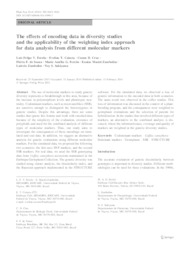The effects of encoding data in diversity studies and the applicability of the weighting index approach for data analysis from different molecular markers.
The effects of encoding data in diversity studies and the applicability of the weighting index approach for data analysis from different molecular markers.
Author(s): FERRÃO, L. F. V.; CAIXETA, E. T.; CRUZ, C. D.; SOUZA, F. de F.; FERRAO, M. A. G.; ZAMBOLIM, Z.; SAKIYAMA, N. S.
Summary: The use of molecular markers to study genetic diversity represents a breakthrough in this area, because of the increase in polymorphism levels and phenotypic neutrality. Codominant markers, such as microsatellites (SSR), are sensitive enough to distinguish the heterozygotes in genetic studies. Despite this advantage, there are some studies that ignore this feature and work with encoded data because of the simplicity of the evaluation, existence of polyploids and need for the combined analysis of different types of molecular markers. Thus, our study aims to investigate the consequences of these encodings on simulated and real data. In addition, we suggest an alternative analysis for genetic evaluations using different molecular markers. For the simulated data, we proposed the following two scenarios: the first uses SNP markers, and the second SSR markers. For real data, we used the SSR genotyping data from Coffea canephora accessions maintained in the Embrapa Germplasm Collection. The genetic diversity was studied using cluster analysis, the dissimilarity index, and the Bayesian approach implemented in the STRUCTURE software. For the simulated data, we observed a loss of genetic information to the encoded data in both scenarios. The same result was observed in the coffee studies. This loss of information was discussed in the context of a plantbreeding program, and the consequences were weighted to germplasm evaluations and the selection of parents for hybridization. In the studies that involved different types of markers, an alternative to the combined analysis is discussed, where the informativeness, coverage and quality of markers are weighted in the genetic diversity studies.
Publication year: 2014
Types of publication: Journal article
Unit: Embrapa Coffee
Observation
Some of Embrapa's publications are published as ePub files. To read them, use or download one of the following free software options to your computer or mobile device. Android: Google Play Books; IOS: iBooks; Windows and Linux: Calibre.
Access other publications
Access the Agricultural Research Database (BDPA) to consult Embrapa's full library collection and records.
Visit Embrapa Bookstore to purchase books and other publications sold by Embrapa.

